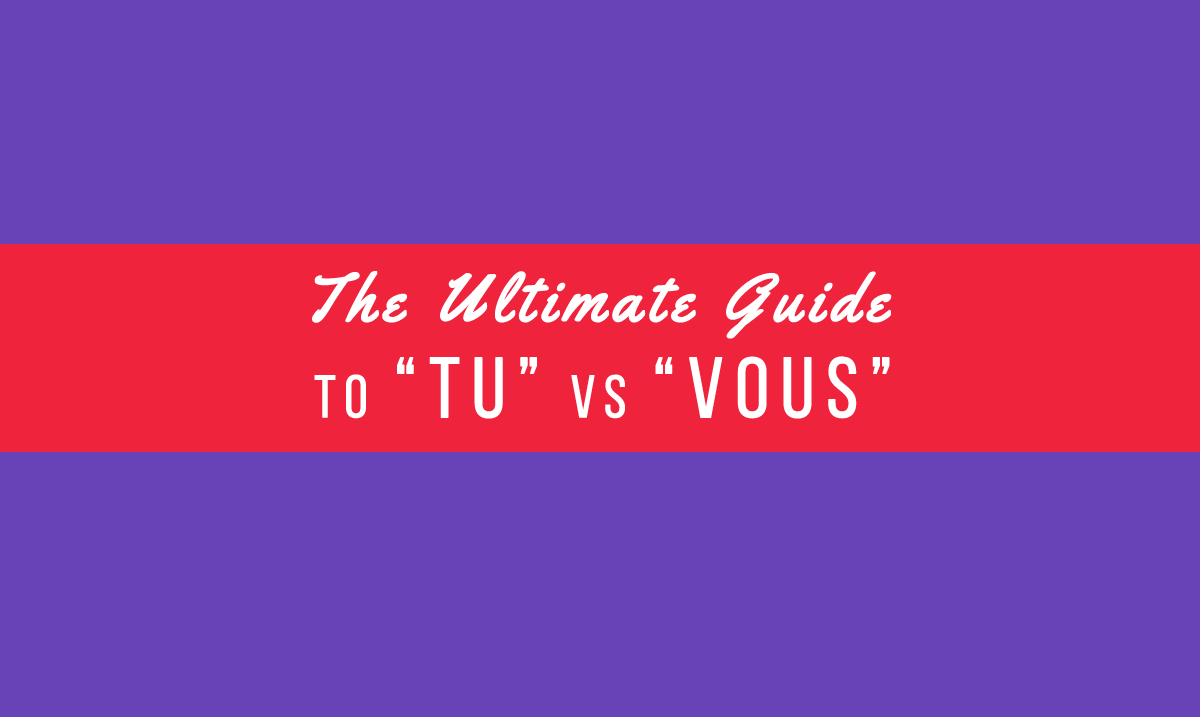In a perfect world, using tu and vous when speaking French is a simple walk in the park. But no, we’re not as lucky as that.

The sad reality is, the rules can be complicated and French learners who find themselves interacting socially with French people often struggle on which “you” to use.
But wait---tu is for children and friends, and vous is for adults and strangers, right? Well yeeaah, that’s a good rule of thumb to follow for starters. Still, it’s very important to master the complete and proper usage of tu and vous in French not only to navigate social interactions, but also for its effects on sentence structure and grammar.
Today, we’ll erase all possible confusions about tu and vous. This article will show you all the ropes about this tricky topic.
I. General Rules: When to use vous to say “you”
Let’s start with the basic rules. You use vous with:
When you have no idea whether you should use vous or tu: better to err on the vous side than offend someone with tu. Later on you can just ask if you should be on more familiar terms and switch to tu.
Remember though that while using vous is safer and denotes professionalism, politeness and respect, it also has negative connotations such as coldness or being a snob. But when in doubt, the positives of using vous could still outweigh the negative.

Speak, Listen, and Write French like a Native with Talk in French Complete Courses
II. General Rules: When to use tu to say “you”
Tu is the go-to form when addressing someone you are very close to, such as:
You also use tu when addressing someone in a similar social standing or situation as you are. This includes:
Tu is also used when talking to inanimate objects, non-humans, animals, and when praying to God.
Tu is also for speaking to children or people who are obviously much younger than you are.
Another reason to use tu is when you’re not feeling respectful towards someone. To prove a point (that you hate his guts and you’re pissed off), you can use tu.

Speak, Listen, and Write French like a Native with Talk in French Complete Courses
Just like the use of vous, there are two sides to using tu. The positive side is that you’re showing love, equality, friendship, and intimacy towards someone. The negative side is that you’re showing disrespect and you’re being rude and offensive.
III. Sample scenarios
The rules mentioned above may not be cut-and-dried so let’s have a look at specific examples below.
Family: Use tu
- Regardless of age, family members use tu when talking to each other. So a septuagenarian grandma and her 4-year old grandson can use tu with each other.
People on the 15-30 year old age range
- Young adults around this age range can pretty much address each other as tu except for cases when a junior employee is talking to his young boss. Cases like that would trigger the use of vous. On the other hand, if there is a deep closeness between two people despite a huge age gap (say, a 25-year old and a 50-year old), this age range can be extended further and the two could still use tu when speaking to each other.
Co-workers speaking to each other
- It sometimes depends on company protocol, so better observe or ask around when you’re new. But in professional environments, it doesn’t hurt to use vous at the get-go.
- Colleagues who are familiar with one another may use the more friendly tu.
- Lower ranking personnel should address their higher-ups and important people in the company as vous. It’s also common for these superiors to reply using vous. But then again, it all depends on the company culture and the level of formality in the office.
I cannot stress this any further, but when in doubt: use vous.
Business contacts: use vous
- When meeting new business contacts, always use vous. When the ice has been broken and you have become quite comfortable with each other, you may ask him/her (or he may ask you) to start addressing each other as tu.
An adult speaking to a child: use tu generally
- People with ages 15 onwards can automatically use tu when talking to children younger than 15, but there are specific social cases that would entail using vous. For example, the child could be a prince or some sort of royalty. In that case, you’ll have to use vous.
A child speaking to an adult: use vous
- Young children speaking to adults (ages 15 and up) who are not direct family members are expected to use vous.
Child speaking to another child: use tu
- Kids below 15 years old address each other using tu.
Teacher to students:
- For pupils younger than 13, teachers automatically use tu.
- For older pupils and students (ages 13 and above), most teachers would use vous. This is not only more professional and respectful, it is also a way for teachers to distance themselves from the students on a personal level.
Students to teacher: use vous
- Regardless of the situations mentioned above such as age bracket, it is expected for students to address their teachers using vous.
Human to non-humans: use tu
- When talking to your pet cat or dog, address them as tu (I mean, how weird would it be to call them vous, right?)
- When screaming at your TV during a football game, use tu. Same thing when your computer dies and you curse at it.
- When you’re fervently praying to God, also use tu.
Still a little bit tricky for you? This LA TIMES flowchart of Tu vs Vous might help you.

IV. Tu and vous in other parts of speech
You already know that using tu and vous would directly affect the verb conjugations. But here let’s look at the other tu and vous forms:

Speak, Listen, and Write French like a Native with Talk in French Complete Courses
V. Unsure which one to use? Ask!
If you find yourself really unsure whether the situation calls for a vous or a tu, don’t worry, it’s okay to ask. Here are some questions you could use in navigating the move from vous to tu:
| French phrase | Translation |
|---|---|
| Est-ce qu'on peut se tutoyer? | Can we address each other as 'tu'? |
| Est-ce que je peux vous tutoyer ? | May I use “tu” with you? |
| on peut se tutoyer ? | Can we use ‘tu’? |
| On se tutoie ? | Do we use “tu” with each other? |
| On peut se tutoyer, non? | We can address each other as 'tu', don't you think? |
| Cela vous dérange si nous nous tutoyons ? | Would it bother you if we address each other using ‘tu’? (this one is highly formal) |
When you’re asked the same questions above or if you would like to set the level of familiarity during your conversation, here are some useful phrases:
| French phrase | Translation |
|---|---|
| tu peux me tutoyer | you can address me as 'tu' |
| ne me tutoyez pas, s'il vous plaît | please don't address me as 'tu' |
| je n'aime pas qu'on me tutoie | I don't like being addressed as 'tu' |
VI. Frequently Asked Questions About Tu and Vous
Most of the cobwebs have probably been cleared in your mind by now. But maybe you still have some niggling questions. Here are some commonly asked questions and their respective answers.
Q: Are there ever any instances when using “vous” might offend someone?
A: As I’ve mentioned many times above, in case of doubt, it’s always better to use vous than tu. But there are some very rare cases where using vous can offend a person. I know you’re thinking, “you gotta be kidding, right?” Nope, not at all.
Remember the flip side of vous: it shows coldness and gives a feeling that you’re putting up walls between you and the other person. For example, with former lovers.
The jump from tu into vous would signify that you’re officially back to being strangers again. Also when one of your good friends suddenly talk to you using vous, it’s disconcerting.
Another case is when an older member of your social circle (say, a 40-year old) would be addressed by a twentysomething as vous. Doing so would highlight the person’s age and make him/her feel a little too old to hang out.
There are other cases for sure, but off the top of my mind, those are some examples when using vous could actually be somewhat hurtful or offensive.
Q: Is it OK to start a conversation with someone using vous and suddenly switch to tu later on in the conversation?
A: It’s possible. Let’s say you begin talking to someone using vous because you’re not so sure how to address him or her yet. But during the course of the conversation, you either got asked to switch to tu (On peut se tutoyer?) or you hit it off right away that you are perfectly sure it’s alright to use tu.
It’s still best to ask the other person of course, but if you’re super sure you’re hitting it off, go for it.
Q: Is it alright if one person uses “tu” while the other uses “vous”?
A: In most cases, people either address each other as tu (together, and vice versa), or vous. But in situations like a teacher addressing his young pupil, then yes. For reference, see the sample cases above.
Q: Do “formal vous” and “plural vous” always have the same conjugation?
A: Yes, the conjugation between the formal and plural you (vous) is always exactly the same. That’s good news, right?
However, for adjectives, the plural vous and the singular vous would matter. For example:
You are beautiful. (singular). The speaker is complimenting one beautiful lady.
You are beautiful (plural). The speaker is addressing two or more beautiful women.
So there. Have I answered all your tu and vous-related troubles? I hope so.
Quick Recap of this Article
Want more simplified French grammar explanations like this? Check out our French Grammar Mastery Course below.

Speak, Listen, and Write French like a Native with Talk in French Complete Courses

My general rule is: Use vous
Merci beaucoup pour ce concret écrit récit.